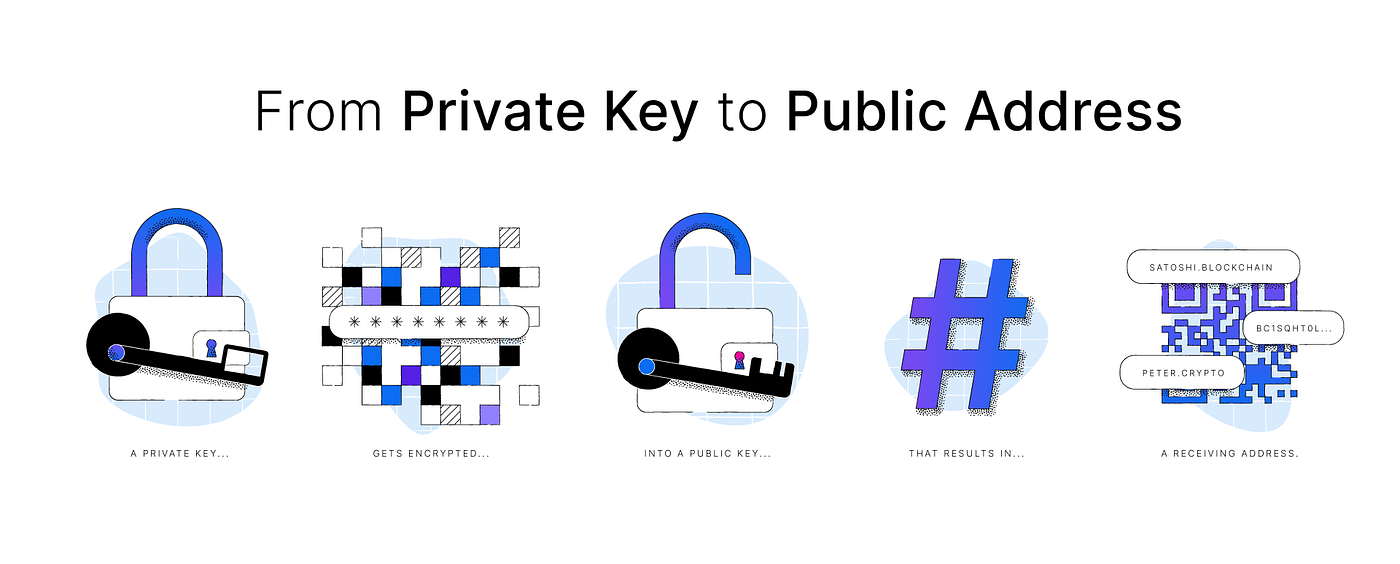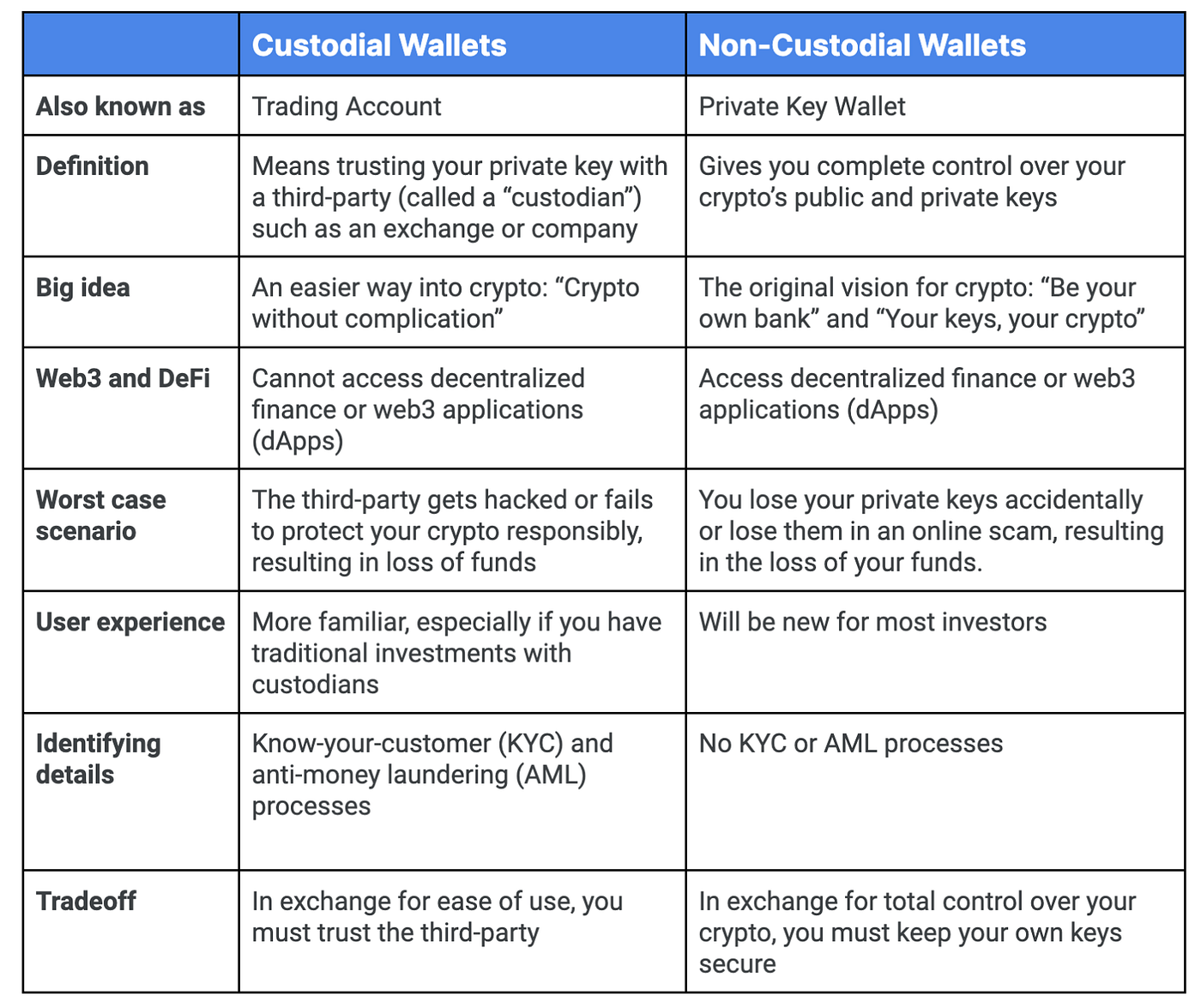A crypto wallet is a digital or software-based way to access your cryptocurrencies.
Unlike a regular wallet, a crypto wallet doesn’t actually hold your assets. Instead, it stores credentials called private keys that give you access to your assets on the blockchain.
Depending on the type of crypto wallet you have, you can:
- Send, receive, and pay with crypto
- Store crypto
- Create a digital “vault” online that’s only accessible to your loved ones
- Interact with web3 applications that let you lend and borrow against your crypto
- Buy, sell, and store NFTs
- Earn on your crypto in a crypto rewards account
To recap: crypto wallets store your public and private keys as well as a linked receiving address so you can send and receive crypto securely
Crypto wallets consist of three parts: a public key, a private key, and a public receiving address.
Whenever someone sends crypto from their wallet, they must use their private key to “sign,” or confirm, the transaction. This digital signature is like a fingerprint, unique to each individual and their private key, proving that the transaction is coming from the legitimate owner of the wallet and hasn’t been tampered with.

Crypto wallets all begin with a private key, a long, randomized string of letters and numbers. These private keys can also take the form of a QR code or mnemonic phrase.
This private key is used to generate a public key through an encryption process. While it’s easy to verify that a specific private and public key fit together as a pair, you can’t “work backwards” and figure out a private key from its public key.
This “one-way” — or “trap-door” — encryption, makes it possible to share a public key without worry that someone will figure out your private key and steal your crypto.
Next, the public key undergoes a mathematical function that “compresses” it into a receiving address (either a QR code or a shorter string of numbers and letters) where you can actually send crypto.
You can generate many public keys — each with their own separate receiving address — from one private key.
Most of the time, you don’t interact directly with these digital keys. Instead, they get stored in wallet files or managed by crypto wallet apps.
Cryptocurrency relies on cryptography, the art of protecting data through codes and digital puzzles called ciphers.
When you use your private key to sign a transaction, the network can verify that the private and public keys represent a pair — while still maintaining the privacy of the information.
Since anyone can remove funds from an address with that address’s matching private key, it’s critical to protect your private key information.
Again, crypto wallets usually manage your private and public keys for you, but it’s important to know that they exist and what they do.
A crypto wallet provides a secure way to store your cryptocurrency, send, and receive it. You can also track your crypto balance and transactions and swap one cryptocurrency for another.
Arguably, though, the greatest benefit is the ability to custody your own funds, or “be your own bank.”
When you hold assets at a traditional financial institution, like a bank or broker, you entrust them with your private information and rely on them to keep your funds safe. They may also charge fees for their services.
With any cryptocurrency wallet that lets you remain in control of your private keys, you are in complete control of your assets. No one can access your funds without your permission, and you don’t have to pay anyone to custody your funds.
This gives you full control of your cryptocurrency and helps keep it safe from hacks, scams, and theft. In countries facing high levels of inflation or capital controls, crypto wallets give people a way to store value that can’t be confiscated by their governments.
To recap: Crypto wallets that let users hold their private keys make self-custody possible for everyone.
That said, not all crypto wallets are created equal. Read on to discover the different kinds of crypto wallets you can select.
There are two main types of crypto wallets: custodial and non-custodial.
Custodial wallets vs. non-custodial wallets

Custodial wallets
Custodial wallets are like bank accounts.
They are managed by a third party, which could be an exchange, a company, or even just another crypto user. These wallets are convenient because you don’t have to worry about losing your private keys or managing them yourself.
However, custodial wallets come with risks. Because a third party manages your crypto, they also control your crypto keys. This means that if the company goes out of business or is hacked, your crypto could be at risk.
Non-custodial wallets
Non-custodial wallets are the opposite of custodial wallets.
With a non-custodial wallet, you are the only one who has access to your private keys. This might sound like a recipe for disaster (after all, if you lose your keys, you lose your crypto), but non-custodial wallets actually offer two big advantages.
First, because you are the only one who has access to your private keys, non-custodial wallets are much more secure than custodial wallets. If a non-custodial wallet is hacked, your crypto is safe because the hacker does not have your private keys.
Second, non-custodial wallets give you full control of your crypto. This means that you can use your crypto however you want, without having to worry about third-party restrictions.
When choosing between a custodial or non-custodial wallet, there is no perfect choice. Each has tradeoffs. The key is finding a wallet that best fits your needs.
If you are new to crypto or just want to dip your toe in the water, a custodial wallet might be a good choice. These wallets are easy to use and require no special expertise.
If you want total control over your crypto or plan on using web3 applications, a non-custodial wallet is the way to go. These wallets might be slightly more complicated to use, but they offer greater security and flexibility.
The Blockchain.com Wallet gives you custodial and non-custodial wallet options in the same app, making it easy to buy, sell, store, and secure your crypto with less effort than managing multiple wallets or apps.
We call our custodial wallet a ‘Trading Account’ and our non-custodial wallet a ‘Private Key Wallet’.










